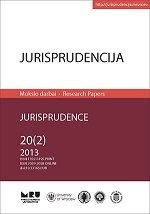Reservations to Human Rights Treaties: Problematic Aspects Related to Gender Issues
Reservations to Human Rights Treaties: Problematic Aspects Related to Gender Issues
Author(s): Aistė AkstinienėSubject(s): Law, Constitution, Jurisprudence
Published by: Mykolas Romeris University
Keywords: human rights; gender issues; reservations; object and purpose of the treaty; Vienna Convention on The Law of Treaties; Convention on the Elimination of All Forms of Discrimination against Women; International Covenant on Civil and Political Rights
Summary/Abstract: In this article the author analyses specific reservations that are being done to the international documents for the protection of human rights and whether Vienna Convention on the Law of the Treaties applies to those human rights treaties or not. Also, the author analyses if reservations, which are incompatible with object and purpose of the treaty, can be done or not and what consequences they might bring. For this reason the author describes the practice of the state members under the Convention on the Elimination of All Forms of Discrimination against Women and International Covenant on Civil and Political Rights. These treaties were chosen not only because they laid down the most significant principles of the protection of human rights, but also due to the great number of reservations made to the fundamental provisions of these treaties. The importance of the topic is that in the human rights treaties the implementation of Vienna Convention on the Law of Treaties provisions on reservations brings several issues, even though on theoretical level the regulation of reservations seems unproblematic. Firstly, there is a major group of states (especially Islamic countries, which base their explanation on the incompatibility with Islamic law), which want to become parties to the treaties that protect human rights and make reservations to fundamental provisions of them at the same time. Secondly, the state parties that make objections to the reservations have to decide if the reservation is compatible with the object and purpose of the treaty or not. The regulation that is laid down in Vienna Convention on the Law of Treaties creates difficulties for the state parties and withdrawal of reservations seems to be more problematic in reality than it is in theory. In order to find the solutions for the above mentioned issues, the author analyses whether the Vienna Convention on the Law of the Treaties regime works properly within the mechanism of making reservations to the human rights treaties or not, what reservations should be kept invalid under the human rights treaties and what could be the solutions for the most effective protection from the invalid reservations that address fundamental rights of human beings in the human rights law.
Journal: Jurisprudencija
- Issue Year: 20/2013
- Issue No: 2
- Page Range: 451-468
- Page Count: 18
- Language: English

